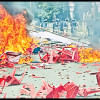Political extortion and thuggery must stop

In recent months, we have watched with increasing alarm as reports of extortion by political activists have continued to emerge from across the country. What makes this more unsettling is the boldness with which such crimes are being carried out under a supposedly neutral interim government. If politically affiliated criminals feel this audacious now, one shudders to think what they might do if their party assumes full or even partial control of the state post-elections.
Part of the reason for this situation is a still-lingering sense of a "security vacuum"—a perception that security forces remain either overstretched or hesitant to act decisively—despite efforts by the government. This has led to a freefall where not only politically connected individuals but also unaffiliated, opportunist, or all-weather criminal groups feel like they can get away with it. According to Dhaka Metropolitan Police, at least 70 extortion cases were filed every month in the capital during the first half of 2025. In the same period, police also recorded many cases involving robbery, mugging, theft, rape, murder, etc. While official figures are often unreliable, it is safe to say the law-and-order situation has been similarly volatile in many other parts of the country as well.
The threat of political extortion and thuggery has been of particular concern after reports frequently implicated grassroots members of major parties. Take, for example, the gruesome murder of scrap metal trader Lal Chand alias Sohag in Dhaka's Mitford area by men linked with BNP. Or the case of the group led by Abdur Razzak Riyad, a leader of the Students Against Discrimination (SAD), who extorted an ex-MP's family and pressured another ex-MP into signing cheques worth crores. Or take the leaked list of 123 alleged extortionists that has caused a stir in Rajshahi recently.
However, the threat of political extortion and thuggery has been of particular concern after reports frequently implicated grassroots members of major parties. Take, for example, the gruesome murder of scrap metal trader Lal Chand alias Sohag in Dhaka's Mitford area by men linked with BNP. Or the case of the group led by Abdur Razzak Riyad, a leader of the Students Against Discrimination (SAD), who extorted an ex-MP's family and pressured another ex-MP into signing cheques worth crores. Or take the leaked list of 123 alleged extortionists that has caused a stir in Rajshahi recently. These alleged criminals—among whom 44 were tied to BNP, 25 to Awami League, and six to Jamaat—were accused of everything from land grabbing and criminal intimidation to extorting money from coaching centres, development projects, and even vendors, showing just how deeply entrenched the culture of political extortion has become.
Political parties, especially BNP, which hopes to form the next government following the upcoming elections, must ask themselves why their disciplinary measures, including expelling those involved in crimes or issuing public denouncements, are proving ineffective in controlling their errant members. They must also address concerns over how many criminals, previously linked with the ousted regime, have managed to rebrand themselves under the patronage of certain parties. Clearly, tough posturing or symbolic distancing from individual criminals is not enough. What we need now are meaningful steps, both from the parties and the government, to ensure that political crimes are not tolerated under any circumstance.


 For all latest news, follow The Daily Star's Google News channel.
For all latest news, follow The Daily Star's Google News channel. 








Comments